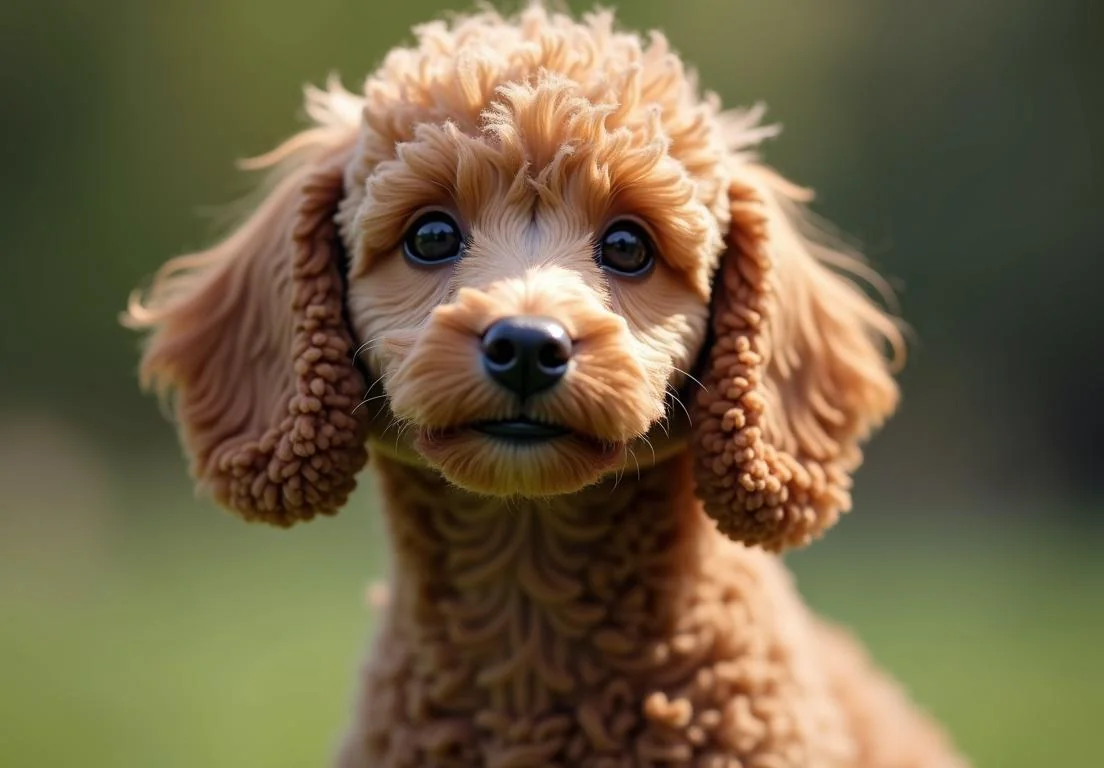Disclosure: We may earn a commission from helpful, relevant links in our content. No cost to you. See our privacy policy.
Unlocking your poodle’s brilliant mind is easier and more fun than you think. These intelligent dogs thrive on mental challenges and playful engagement. Are you ready to boost your pup’s brainpower while strengthening your bond?
Brain games are essential for keeping your poodle mentally stimulated, reducing boredom, and enhancing their overall intelligence. Unlocking their potential goes beyond simple tricks and commands—it’s about providing engaging activities that pique their curiosity. Discover the secret strategies the most savvy poodle owners know below!

Why Are Brain Games Important for Poodles?
Engaging your Poodle’s mind with brain games is more than just fun; it’s vital for their emotional health and cognitive development. Poodles are among the most intelligent dog breeds, boasting high levels of curiosity and energy. Just like us, they can get bored and restless without the mental stimulation they need.
Enhanced Emotional Well-being : Brain games can help alleviate anxiety, stress, and destructive behaviors. Keeping their minds busy fosters a sense of accomplishment and satisfaction. When a Poodle is engaged, it’s much less likely to engage in unwanted behaviors, like chewing on furniture or excessive barking.
Cognitive Development : Regularly challenging your Poodle with interactive games promotes cognitive function. These activities strengthen problem-solving skills and enhance memory. Research shows that mental stimulation can help delay cognitive decline as dogs age. The more you stimulate their minds, the sharper they’ll stay for longer.
Bonding Opportunity : Playing brain games also strengthens the bond between you and your Poodle. Working together on puzzles or tricks fosters trust and communication, creating a deeper emotional connection over time.
In short, prioritizing brain games is crucial for raising a happy, healthy, and well-adjusted Poodle.
What Types of Brain Games Work Best?
The best brain games for your Poodle tap into their intelligence and playful nature. Here are a few activities you might consider:
-
Puzzle Toys : These toys challenge your pup to solve problems to get treats. Look for those with multiple levels of difficulty to keep it interesting.
-
Hide and Seek : This classic game isn’t just for kids! Teach your Poodle to stay, hide somewhere in your home, and then call them to find you. It sharpens their tracking skills and provides a fun chase.
-
Scent Work : Poodles have a keen sense of smell. Scatter treats around a room and encourage your dog to sniff and find them. This taps into their natural instincts and keeps them engaged.
-
Teaching New Tricks : Always a reliable option, teaching new tricks forces your Poodle to think critically and understand commands. Use positive reinforcement for a productive training session.
-
Interactive Games : Consider apps designed for dogs that use sound or movement to engage your Poodle. DogTV or free interactive videos can draw their attention and stimulate their brains.
An additional angle to consider: DIY Brain Games. You don’t need to invest in high-tech gadgets to stimulate your Poodle’s mind. Simple household items can create engaging challenges. For example, hide treats under cups and shuffle them around, encouraging your pup to find the hidden snack. This not only promotes cognitive function but also conveys the idea that learning doesn’t have to be costly or complicated.
Focusing on these activities will not only entertain your Poodle but also unlock their brilliant potential!
How Can I Create DIY Brain Games at Home?
Creating DIY brain games for your poodle doesn’t have to be complicated or expensive. With a little creativity, you can transform everyday items into effective mental challenges.
Hide and Seek is a classic, where you can hide somewhere in the house and call your poodle to find you. It’s a delightful way to engage their sense of smell and make them think. Or try a simple Cup Game: take three cups and hide a treat under one, then shuffle them around. Let your poodle use their nose to find the treat—this sharpens their problem-solving skills and keeps them entertained.
Another fun idea is a Treasure Hunt. Scatter some treats around your home or yard and encourage your poodle to discover them. Start with easier hiding spots and gradually increase the difficulty level as they get the hang of it.
If you’re feeling ambitious, construct a simple Obstacle Course using household items. You can use chairs, cushions, and broomsticks to create fun challenges that encourage physical activity along with mental stimulation.
Lastly, don’t forget about Puzzle Boxes—a simple cardboard box with a few openings can be turned into a mini puzzle. Place treats inside and seal it up so your poodle has to figure out how to get to the rewards.
These activities not only stimulate your poodle’s mind but also strengthen your bond and ensure they stay happy and healthy.
Are Puzzle Toys Really Beneficial?
Puzzle toys offer a great way to keep your poodle engaged while also providing numerous benefits for their mental health.
These toys challenge your dog to think and strategize, which can help reduce boredom and destructive behaviors that might arise when they’re left alone or under-stimulated.
One of the main advantages of interactive puzzle toys is that they tap into a poodle’s natural instincts. These clever dogs love to work for their food and treats, so a puzzle toy not only provides a reward but also engages their mental faculties. Regular use of these toys can sharpen their problem-solving abilities, encouraging a more focused and calm demeanor.
Additionally, puzzle toys can help prevent anxiety.
When dogs are mentally stimulated, they’re less likely to engage in anxiety-driven behaviors, such as chewing furniture or barking excessively.
Moreover, since poodles are known for their intelligence, incorporating puzzle toys into their routine can foster a sense of accomplishment. This boosts their confidence and contributes to a happy, well-adjusted pet.
For best results, consider incorporating a mix of different types of puzzle toys. Some require simple manipulation to release a treat, while others might involve sliding pieces or solving complex mazes. Tailor the level of difficulty to your poodle’s skill so they remain challenged but not frustrated. That way, playtime stays enjoyable and stimulating for your furry friend.
How Does Socialization Affect Cognitive Skills?
Socialization plays a crucial role in enhancing a poodle’s cognitive skills.
Engaging with other dogs and people helps your poodle practice their communication abilities and learn social cues. This exposure not only improves behavior but also boosts their problem-solving skills.
When poodles interact in varied environments, they’re challenged to adapt to new situations, which can sharpen their mental agility. For instance, if your poodle encounters different dog breeds at the park, they learn to navigate those interactions and respond appropriately. It’s like a workout for their brain!
Socialization is a critical period in a puppy’s development, particularly between the ages of 4 to 12 weeks, where they learn to engage with their environment, other dogs, and humans. This stage significantly influences their cognitive development, helping them to build problem-solving skills and process information. Research indicates that early positive social experiences contribute to a dog’s adaptability and ability to perform tasks, ultimately enhancing their cognitive abilities. Engaging in diverse environments during this time not only boosts mental development but also lays the groundwork for improved learning outcomes later on.
Additionally, positive play experiences can reduce anxiety, which is vital for cognitive function.
Engaging in positive play experiences has been shown to be crucial for both emotional and cognitive well-being. For example, mental stimulation in dogs significantly reduces anxiety and stress, which can lead to improved behavior and emotional health. Research indicates that activities such as puzzle toys and scent games not only provide entertainment but also contribute to a calmer mental state, akin to the importance of cognitive exercises that maintain focus and reduce anxiety. Dogs that receive regular mental challenges tend to exhibit fewer behavioral problems and greater overall happiness.
An anxious dog might struggle with focus, whereas a well-socialized poodle often displays more curiosity and engagement with their surroundings. So taking time for small group play dates or doggy daycares not only nurtures their social skills but also promotes mental development.
Can Training Classes Enhance Brain Power?
Training classes are a fantastic way to give your poodle’s brain a workout. These classes offer structured environments where dogs can learn commands, tricks, and even complex tasks. By practicing in a group, your poodle learns to focus despite distractions, which is a key cognitive skill.
A unique benefit of training classes is the bonding experience they provide between you and your dog. This connection can lead to better understanding and communication, enhancing your poodle’s ability to learn. Regular training keeps their mind engaged, which can help ward off behavioral issues born from boredom.
Consider looking for classes that incorporate fun activities like agility courses or scent work. These interactive exercises not only stimulate your poodle’s mind but also keep them physically active. Plus, the variety keeps the learning process exciting and prevents monotony.
In essence, investing time in training can significantly impact your poodle’s brain power, making it a win-win for both of you.
What Are Fun Challenges for Advanced Poodles?
Advanced poodles thrive on mental stimulation and are always eager for a challenge. To tap into their brilliant minds, consider these engaging activities that push their limits:
-
Puzzle Toys : Invest in high-difficulty puzzle toys where they have to figure out how to release treats. These toys not only entertain but also encourage problem-solving skills.
-
Advanced Obedience Training : Incorporate tricks like “play dead” or “heel” while introducing distractions. This builds focus and strengthens your bond.
-
Scent Games : Hide treats around your home for a sniffing adventure. Start with easier spots, then gradually increase the difficulty to challenge their tracking abilities.
-
Agility Course : Set up a DIY agility course in your backyard or living room. Jumps, tunnels, and weave poles will keep your poodle active and engaged.
-
Interactive Training Sessions : Use clicker training to reinforce commands and tricks but raise the stakes by adding multiple commands in succession or using hand signals alone.
-
Dog Sports : Look into performance sports like flyball or herding trials that cater to their energetic nature and fast-learning skills. This can provide both exercise and socialization.
These activities not only keep your poodle entertained but also sharpen their cognitive skills. The key is to mix things up regularly to keep their mind engaged and avoid boredom.
Trivia: Are Poodles the Smartest Dogs?
Poodles rank among the most intelligent dog breeds, often landing in the top five of various canine intelligence lists. Research conducted by canine psychologist Stanley Coren highlights their exceptional capacity to learn commands quickly—a trait that enthusiasts and trainers alike celebrate.
Interestingly, they’re not just brains; their intelligence also translates to adaptability. Poodles thrive in various roles, from service animals to performers in circuses. This versatility stems from their innate curiosity and eagerness to please their humans.
Here are a few fascinating facts about poodle intelligence :
- Quick Learners: Poodles can learn a new command in as few as 5 repetitions, making training a breeze.
- High Obedience: They’re known for their ability to follow commands with a success rate of about 95%, placing them high on the obedience scale.
- Socially Aware: Poodles are excellent at making sense of human emotions, often responding appropriately to their owner’s mood.
Their intelligence isn’t just in tricks and commands; they also excel in problem-solving, making them perfect candidates for challenges and puzzles that stimulate their minds. Providing engaging activities tailored to their intelligence will keep them happy and well-rounded companions.
Engaging with Your Poodle: More Than Just Games
Bonding with your poodle goes beyond tossing a ball or playing fetch. These clever pups thrive on mental stimulation, and there are plenty of creative ways to engage with them that combine fun and learning. For example, obstacle courses made from household items can be a fantastic way to challenge your poodle’s agility and problem-solving skills. Set up a series of chairs, boxes, or tunnels and guide your furry friend through them. It’s a great way to keep them physically active while also making them think.
Scent work is another enriching activity. Hide their favorite toys or treats around the house or yard and let them use their nose to find them. Poodles have a keen sense of smell, so this taps into their natural instincts and keeps their minds sharp. You might be surprised at how focused they become on the hunt.
Then there’s interactive feeding. Instead of a traditional bowl, try using puzzle feeders or placing their kibble in a muffin tin, covered with tennis balls. It transforms their mealtime into a more engaging activity, requiring them to solve the problem of how to get to the food.
Additionally, why not incorporate theater into your routine? Teach your poodle simple tricks or even short sequences of tricks that they can perform. Not only does this build a stronger bond, but it also enhances their cognitive skills. Plus, your friends will be impressed by your pooch’s star power!
A great idea that often gets overlooked is music therapy. Poodles often respond to music, especially if it’s soothing or has a rhythm. Play different genres while you’re both relaxing—watch their reactions! This can help create a calming environment, reduce anxiety, and further deepen your bond.
Lastly, consider engaging your poodle in social activities. Arrange playdates with other trained dogs. This not only provides social enrichment for your poodle but also encourages them to adapt and learn from their peers.
These activities foster a deeper connection while stimulating your poodle’s mind, proving that bonding doesn’t have to be limited to standard games. It’s all about mixing things up and using your creativity to keep both of you engaged and entertained.
Alex, a passionate animal lover, has experience in training and understanding animal behavior. As a proud pet parent to two dogs and three cats, he founded AnimalReport.net to share insights from animal experts and expand his knowledge of the animal kingdom.




